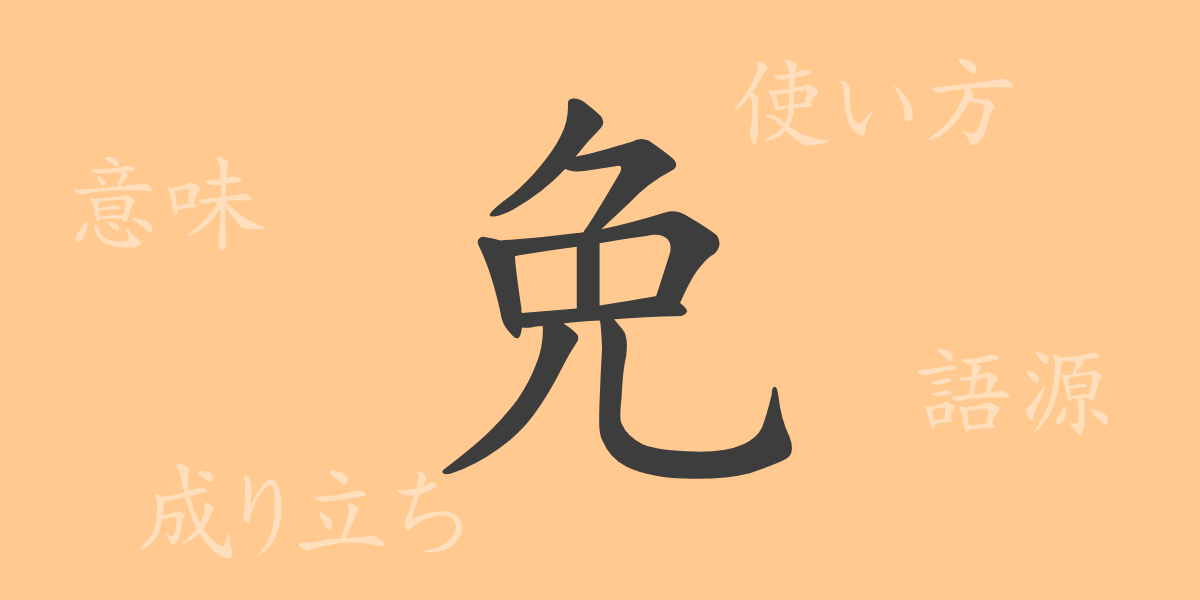The beauty of the Japanese language is brought about by its complex and rich characters. The 常用漢字 (じょうようかんじ, jōyō kanji) “免” (めん, men) is one of the characters frequently used in everyday life and business settings. In this article, we will delve deeply into the etymology, meaning, usage, and idiomatic expressions involving the kanji “免” (めん, men). We hope this will help our readers understand the diverse aspects of “免” (めん, men) and acquire a richer Japanese expression.
Etymology of 免 (めん, men)
The kanji “免” (めん, men) has evolved from pictographs in ancient China. Originally, it depicted a bird with feathers spread out, and later developed to signify status or privilege. This evolution is believed to be derived from ancient customs where specific feather adornments symbolized status. In Japan, this kanji is also used in various contexts and has acquired unique meanings.
Meaning and Usage of 免 (めん, men)
The kanji “免” (めん, men) primarily means “to escape” (まぬか.れる, manuka.reru), “to exempt” (まぬが.れる, manuga.reru), and “license” (めんきょ, menkyo). “To escape” (まぬか.れる, manuka.reru) means to evade or avoid something, “to exempt” (まぬが.れる, manuga.reru) means to be released from responsibility or duty, and “license” (めんきょ, menkyo) signifies granting a specific qualification or permission. These usages represent important aspects of “免” (めん, men) in the Japanese language and are utilized in many situations.
Reading, Stroke Count, and Radical of 免 (めん, men)
The kanji “免” (めん, men) has multiple readings in Japanese.
- Readings: In 音読み (おんよみ, onyomi) it is “めん” (men), and in 訓読み (くんよみ, kunyomi) it is “まぬか.れる” (manuka.reru), “まぬが.れる” (manuga.reru), “まぬが.る” (manuga.ru).
- Stroke Count: “免” (めん, men) has a total of 8 strokes.
- Radical: The radical of “免” (めん, men) is “儿” (にんにょう, ninnyō), and its form as a radical is “免冠” (めんかん, menkan).
Idioms and Proverbs Using 免 (めん, men) and Their Meanings
Here are some idioms and proverbs that include “免” (めん, men):
- 免許皆伝 (めんきょかいでん, menkyokaiden): A phrase recognizing that someone has reached the highest level in a particular art or academic field.
- 免職 (めんしょく, menshoku): The act of being relieved from one’s duties or the disposition thereof.
- 罪を免れる (つみをまぬかれる, tsumi o manuka.reru): To escape from sin or responsibility.
- 免税 (めんぜい, menzei): A state where one is not required to pay taxes.
These expressions exemplify the rich expressive power of the Japanese language and are used in various contexts.
Conclusion about 免 (めん, men)
The kanji “免” (めん, men) conveys the deep aspects of the Japanese language through its rich history and usage. Its evolution from etymology to modern usage, multiple meanings, and the idioms and proverbs it is used in reflect the sophistication of language and culture. We hope this article deepens our readers’ understanding of the language and aids in more effective communication.

























